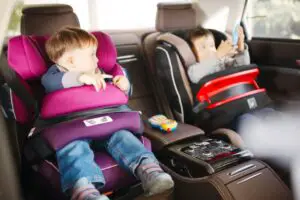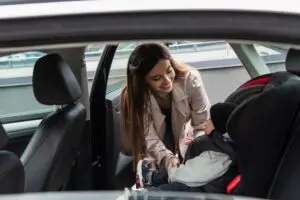In the year 2017 alone, the state of New Hampshire has ranked the 9th highest state in the United States to have people die in car accidents.
While this is a broad statement, many of them were likely children.
To combat this, various car seat laws in New Hampshire are in place which requires children to be in car seats.
This starts from birth and up till the age of 2. Children must be in a rear-facing car seat.
They can move to a front-facing car seat once they exceed the rear-facing car seat’s limits and then do the same to move up to a booster seat.
If you want even more exact numbers, keep reading this article to get all the relevant information you need to follow the rules set by the state.
Table of Contents
- 1 New Hampshire Car Seat Requirements By Ages
- 2 Car Seat Weight And Height Requirements In New Hampshire
- 3 Type Of Car Seat Laws In New Hampshire
- 4 When Is The Time For My Child To Sit In The Front Seat In New Hampshire?
- 5 What Happens If You Leave Your Child In A Car In New Hampshire?
- 6 Taxi Car Seat Laws In New Hampshire
- 7 New Hampshire Law Regarding Car Seats In Accidents
- 8 Uber Car Seat Laws In New Hampshire
- 9 Conclusion
New Hampshire Car Seat Requirements By Ages

The state of New Hampshire has opted to promote child seat laws more in line with the child’s age, which is why the car seat laws can change according to the child’s age.
1 Year Old
From the moment a child is born, they must be seated in a car seat when traveling in a car.
For newborns and one-year-old, you are required to keep the child in a rear-facing car seat until they at least grow up to 2 years old.
2 Year Old
Once the child is two years old, you have the option to switch to a front-facing car seat, but only if the child reaches the weight limit of the harness of the front-facing car seat, which is 40 pounds.
3 Year Old
At 3, your child is still likely to be below 40 pounds, so they should stick to a rear-facing car seat.
However, if they are above 40 pounds, you can have them switch to a front-facing car seat.
4 Year Old
By four years old, your child should have outgrown the rear-facing car seat’s limits and should be placed inside a front-facing car seat.
This will be their car seat for as long as they are within the limits of the car seat.
5 Year Old
As the child approaches five years old, you should ensure that they are well seated in their front-facing car seat, which means adjusting the harness and ensuring they are within the height and weight limits of the seat.
6 Year Old
Once your child reaches the age of 6, you should be ready to switch to a booster seat, as they should be getting close to exceeding the limits of the front-facing car seat.
7 – 9 Year Old
Between the ages of 7 and 9, your child is within the legal age limit for the state of New Hampshire to use a booster seat.
Here, you should make sure that he has outgrown the harness of the front-facing car seat.
10 Year Old
Your child can use the booster seat until they are within the weight limit of the booster seat or until they are taller than 4 feet and 9 inches.
Beyond these points, your child can stop using car seats and start using the car’s seat belts.
Car Seat Weight And Height Requirements In New Hampshire

When it comes to the weight and height of your child, you have to adjust your car seat or get one entirely.
Here are a few key points you should remember regarding the height and weight of your child.
Firstly, you should ensure that your infant children below 25 pounds should be in a rear-facing car seat, and once they reach the seat’s height and weight limit, they should be moved to a front-facing car seat which they must use between 40 to 90 pounds.
Beyond 90 pounds, your child should be in a booster seat, and they should use this seat until they are 110 pounds or are taller than 4 feet and 9 inches.
Once they reach this position, they should move to the seat belt in the car.
Type Of Car Seat Laws In New Hampshire
According to the type of car seat you are using for your child, you need to make sure that certain rules are being followed for your child’s safety.
1. Rear Facing Car Seat
You should use the rear-facing car seat for as long as possible. You should also ensure a harness is included in the rear-facing car seat.
2. Forward Facing Car Seat
Regarding forward-facing car seats, you are legally required to have a harness system in them. Besides that, you should ensure your child is comfortable in this harness.
3. Booster Seat
Booster seats should properly keep your child on the level they can use the lap and shoulder safety belts. This seat should usually be used until the child is 4 feet and 9 inches long.
When Is The Time For My Child To Sit In The Front Seat In New Hampshire?
The state of New Hampshire has not set any laws about when or how old you’re your child must be to sit in the front seat of the car.
That being said, there are rules you must follow when seating your child in the front seat of the car, mostly revolving around your child is restrained properly, either in a car seat or a seat belt.
I recommend you keep your child in the back seat of the car until or unless they can properly use seat belts.
What Happens If You Leave Your Child In A Car In New Hampshire?
There are no laws on whether you can leave your child in a car in the state of New Hampshire. This means that the act is legal; however, you should take care when doing so.
For the most part, you should not leave your child inside a car if the weather conditions are too extreme or the car is still running.
This can be very dangerous and life-threatening to the child.
Taxi Car Seat Laws In New Hampshire
According to the state of New Hampshire, you are not required to follow the state’s car seat laws. This means that you can ride with your child in a taxi without them using a car seat.
Just because it is legal for you to do so does not mean that you should make a habit of doing so.
Instead, you should try your best to set up a booster seat or another car seat in the taxi for the health of your child.
To make this as convenient as possible, you should try and get yourself a car seat that is both easy to move and set up.
New Hampshire Law Regarding Car Seats In Accidents
New Hampshire has not set any laws about car seats and accidents.
This means that there is no legal reason for you to change your car seat after an accident, nor is there a possibility to get a replacement car seat via the government or insurance.
As a general rule, you should replace your car seats after an accident as they are not durable enough to survive two accidents.
Uber Car Seat Laws In New Hampshire
Uber follow the same rules regarding car seat regulations in New Hampshire. This means that you are not required to set up a booster seat when traveling in an Uber.
Just like for taxis, it is recommended to get a good and easy-to-set-up booster seat so that you can use it in Uber as well.
Conclusion
New Hampshire car seat laws are very straightforward when you get into the meat of them.
While they may be a bit difficult to understand due to their constant changing of weights, which determine whether the child should sit in a particular seat or not, all of this is necessary for the health of your child.
Now that you have read this article, you should have full knowledge of how you should go about following the car seat laws that the state has set as well as the specifics of these laws so that you can ensure the safety of your child.

I am Tahir Azam, and I have been writing amazing articles for TaxiHack for as long as I can remember. I know everything that is to know when it comes to automobiles and is always on top of industry news and developments. While I am not an expert by any means, I pride myself on knowing the ins and outs of many different problems and, of course, their solutions. The articles on our website are some of the best and well-researched content that you will find, and I spend countless hours making sure this remains to be true. This is why I ask you to take your time out and read some of my articles, especially if you find a topic that resonates with you or is something you are looking into. This way, you will find the perfect mix of information and tips on your desired topic. Learn more about Tahir.



